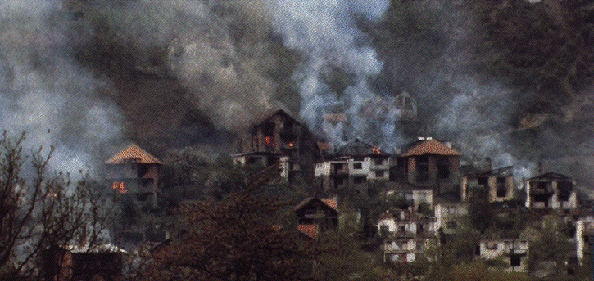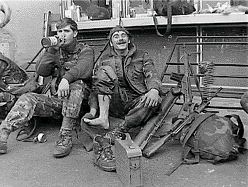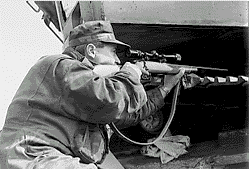The Road Out Of Bosnia
BBC World Service News — 12-05-1992 14:00hrs
A human catastrophe is unfolding in the Balkans as thousands of refugees are driven from their homes in Bosnia-Hercegovina.
 As the bombardment of Mostar from south-east Hercegovina continued today (Tuesday), EC monitors here in Croatia have announced that negotiations yesterday between themselves and the warring Serbs and Hercegovinan Croats had permitted the safe evacuation from Sarajevo of thirteen of their beleaguered EC colleagues. EC spokesmen say the men have successfully negotiated the appallingly hazardous war-zone between Sarajevo and the Grude front line on their way to their headquarters in Split.
As the bombardment of Mostar from south-east Hercegovina continued today (Tuesday), EC monitors here in Croatia have announced that negotiations yesterday between themselves and the warring Serbs and Hercegovinan Croats had permitted the safe evacuation from Sarajevo of thirteen of their beleaguered EC colleagues. EC spokesmen say the men have successfully negotiated the appallingly hazardous war-zone between Sarajevo and the Grude front line on their way to their headquarters in Split.
The journey facing the retreating monitors in their three vehicles should nevertheless have been more comfortable than appalling conditions now being faced by the trail of human misery pouring out of Bosnia-Hercegovina for the relative safety of Croatian coastal resorts.
Packed buses of exhausted and bewildered women and children arrive here in Split in their thousands, often dehydrated and always aggravating an already serious problem for the Red Cross, the local authorities and the newly arrived officers of the United Nations High Commissioner for Refugees. Usually reliable official estimates put the total number of refugees fleeing Bosnia-Hercegovina in the face of Serbian advances at around 250,000 – mostly Muslims. A further 400,000 are believed to be displaced within their borders.
 Two days ago 1,500 women and children arrived and were then shipped north to Rijeka because the two large sports centres in Split could not accommodate them, simply swelling the number in transit with no more food or possessions than they can carry with them. Later that night another 100 children from Mostar arrived at the Split harbour bus depot and are now destined for sanctuary on islands such as Brac, Hvar and Korcula. Yesterday hundreds more arrived and today a total consignment of almost 100 had no idea where they would be going from here.
Two days ago 1,500 women and children arrived and were then shipped north to Rijeka because the two large sports centres in Split could not accommodate them, simply swelling the number in transit with no more food or possessions than they can carry with them. Later that night another 100 children from Mostar arrived at the Split harbour bus depot and are now destined for sanctuary on islands such as Brac, Hvar and Korcula. Yesterday hundreds more arrived and today a total consignment of almost 100 had no idea where they would be going from here.
 More serious, however, is the intermittent withdrawal from Bosnia-Hercegovina of most international agencies. I have just visited the Croat-Hercegovinan military headquarters at Grude, 30 miles north-west of Mostar where, during the fifth air-raid alert before lunch, Col. Petkovic was confident that his 6,500 troops at the Imotski-Grude front line around northern Mostar could hold out in the long-term, but was pessimistic that the single dirt-track mountain road out of Mostar could be kept open – let alone safe – for the thousands of refugees expected to be forced north and west or trapped between the opposing sides. This road has stretches which are directly under the longer-range Serbian guns and provide rich pickings for Serbian air attacks.
More serious, however, is the intermittent withdrawal from Bosnia-Hercegovina of most international agencies. I have just visited the Croat-Hercegovinan military headquarters at Grude, 30 miles north-west of Mostar where, during the fifth air-raid alert before lunch, Col. Petkovic was confident that his 6,500 troops at the Imotski-Grude front line around northern Mostar could hold out in the long-term, but was pessimistic that the single dirt-track mountain road out of Mostar could be kept open – let alone safe – for the thousands of refugees expected to be forced north and west or trapped between the opposing sides. This road has stretches which are directly under the longer-range Serbian guns and provide rich pickings for Serbian air attacks.
"The EC monitors are very good at forming agreements on paper," he told me wryly in his bunker HQ at the Hotel Dubrovnik in Grude. "But that's all they are good for," he added after a three-hour session with the leader of the Split EC monitor team, Dieter Waltman, former German ambassador to Baghdad. In Petkovic's view the war is now so dirty, inhuman and devoid of principles that such agreements for the safe passage of refugees, or even diplomats, are largely meaningless.
The Serbs seldom abide by the limited cease-fire timings, he claims, though EC monitors would stress that Croat-Hercegovinan troops are not always entirely blameless either. The thankless task of the monitors, who are merely here to observe and where possible liaise between the warring factions, is made no easier by increasingly irritated Croats who believe the monitors should be partisan peacekeepers.
 Amid bomb-shattered apartment blocks at Grude, hundreds of young, tanned soldiers sport uniforms and 9mm weapons from around the world, their conversation ranging from horrendous tales of enemy atrocities perpetrated on prisoners and innocent civilians to the baffled truism of a young ship's cook, now manning an ack-ack position over-looking Mostar, who simply asks me: "What have we done to each other? What have we Croats and Serbs done to be in this position?"
Amid bomb-shattered apartment blocks at Grude, hundreds of young, tanned soldiers sport uniforms and 9mm weapons from around the world, their conversation ranging from horrendous tales of enemy atrocities perpetrated on prisoners and innocent civilians to the baffled truism of a young ship's cook, now manning an ack-ack position over-looking Mostar, who simply asks me: "What have we done to each other? What have we Croats and Serbs done to be in this position?"
The big question now is how the war will develop under the newly appointed Serbian commander in Hercegovina, General Panic. He is well known to his former brother-officer in the JNA – now his adversary in Grude:
"I can only say that things will get worse," says Col. Petkovic.
"He is the most hardline of hardliners and I expect him to destroy what he knows he cannot win." He adds that his own troops are sufficiently well-armed with identical weaponry to that ranged against them for him to be confident of long-term success – despite his total lack of air cover.
 And he agrees that the next major move in the war may depend as much on whether Belgrade can prevent civil revolt within Serbia itself as with any strategic decision to isolate Southern Croatia or move the conflict further south towards Kosovo.
And he agrees that the next major move in the war may depend as much on whether Belgrade can prevent civil revolt within Serbia itself as with any strategic decision to isolate Southern Croatia or move the conflict further south towards Kosovo.
Meanwhile it seems clear that the almost unprecedented savagery of the present battles in Bosnia Hercegovina have finally left the innocent civilian population to a distinctly grim future without even the major international agencies able to monitor their fate.
 Despite months of warning from those of us on the ground (Nov 1991 – Feb 1992), Western governments were caught off-guard and quite unprepared for the human disaster which swept across Bosnia-Hercegovina in the Spring of 1992.
Despite months of warning from those of us on the ground (Nov 1991 – Feb 1992), Western governments were caught off-guard and quite unprepared for the human disaster which swept across Bosnia-Hercegovina in the Spring of 1992.
As Serbs and Croats pushed west and east respectively, grabbing territory, destroying houses and villages and slaughtering or driving homeless refugees before them, only popular frustration persuaded European politicians to act as the irrational brutality spread unchecked.
Their response was to send EC Monitors to 'observe and mediate where possible'. This policy only reassured the brutal militias that nothing need stop them in their plan to partition Bosnia along ethnic/nationalist lines.
© (1992) Christopher Long. Copyright, Syndication & All Rights Reserved Worldwide.
The text and graphical content of this and linked documents are the copyright of their author and or creator and site designer, Christopher Long, unless otherwise stated. No publication, reproduction or exploitation of this material may be made in any form prior to clear written agreement of terms with the author or his agents.
















